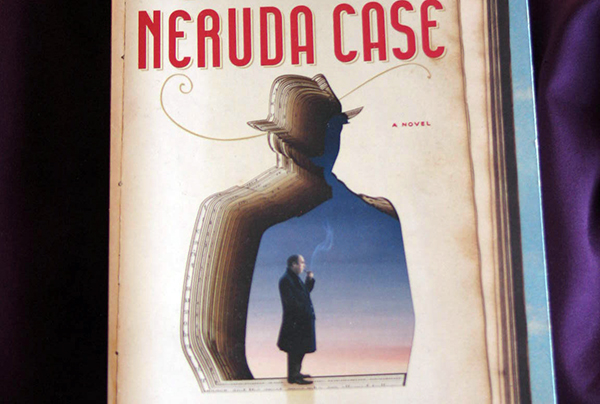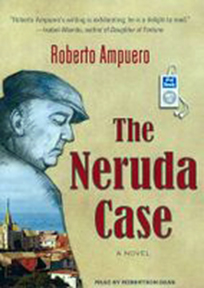Home »

Novel looks at self delusion in pursuit of pleasure
Book review
By Derryll White
Ampuero, Roberto (2012). The Neruda Case.
“There’s no one more thoughtless than the man who sees only his own contentment.”
One of the very nice things about travelling is that it exposes one to new things and puts one in contact with old loves and passions. I went to San Francisco recently and almost immediately visited City Lights Bookstore. The store has been an anchor for the cultural life of the North Beach area for 60 years and I have been visiting it infrequently for 40. The staff is knowledgeable and the selection of books varied. As this volume features one of my favourite international poets, Pablo Neruda, it wasn’t difficult to be convinced that I should read it.
 This novel begins in Valparaiso, in pre-Pinochet Chile. It seemed amazingly apropos to read it in San Francisco, a city that mirrors Ampuero’s description of the Chilean city. Both are equally foreign to the precipitous landlocked country of the Kootenays.
This novel begins in Valparaiso, in pre-Pinochet Chile. It seemed amazingly apropos to read it in San Francisco, a city that mirrors Ampuero’s description of the Chilean city. Both are equally foreign to the precipitous landlocked country of the Kootenays.
The major character is Cayetano Brulé, a misplaced Cuban washed onto Chilean shores shortly before Pinochet’s mad military capture of that country. Cayetano is inspired, indeed shaped by Georges Simenon’s books featuring Inspector Maigret. He reads them for instruction in the art of detecting. And Cayetano, a young man, opens himself to the insights of the famous dying poet and womanizer, Pablo Neruda.
In the end, this novel focuses on the ways we each delude ourselves, and those around us, in pursuit of our own pleasure. Cayetano Brulé takes the reader through a catalogue of the victims of the happiness of the poet, Neruda. And I know much of this to be true. We have all abandoned love in the pursuit of more ideal love, of better sex, of more prestige. As the detective Cayetano awakens to the changes of his own perceptions of the world, he has revealed to him the baseness of man.
I enjoyed this book immensely, and recommend it to all readers.
********
Excerpts from the novel:
EXISTENCE – In any case, the people of this port city [Valparaiso], or portenos, even dignified – and now he considered himself one of them – believed that good and bad luck crouched, waiting, around any corner or just beyond the curve of some stone staircase, and for that reason everything in the world was relative and fleeting. For portenos, accustomed to climbing and descending hills, existence was like their city: at times one soared joyfully, trusting the wave’s crest, and at times one lay depressed and unmoving in the depths of a ravine. One could always rise or fall. Nothing was certain, nothing was forever. No circumstance was permanent. With existence came uncertainty, and only death had no room for change.
VALPARAISO – …it had not been founded by any official authority, civil or ecclesiastical, and now had half a million long-suffering inhabitants in its fifty teeming anarchic hills. A horseshoe bay formed a dazzling amphitheater, and people risked their lives on shabby postwar trolleys and a handful of whining cable cars each time they rode to work or to homes with crumbling balconies and gardens that settled gracefully on peaks or clung precariously to hillsides.
MYSTERY GENRE – “…if poetry transports us to the heavens, crime novels plunge you into life the way it really is; they dirty your hands and blacken your face the way coal stains engine stokers on trains in the south, where I was born.”
LIFE – Life wasn’t only a parade of disguises…, but also a lottery that dealt new tickets every morning. In reality, life was like Valparaiso. Sometimes you were up high, other times low, but in an instant everything could change. An unexpected staircase was enough to climb the heights, while a single trip over a stone could send you crashing downhill, just like the bones that rolled from the graveyard to the docks.
WRITING – “Do you write poems on that machine?”
“Are you crazy? Nobody writes decent poems on keys. Poetry is written by hand, with a pen, my friend. Verses descend from the brain like the tide on the Chloé coast; they flow through the body to your hands and pour out on the page.”
IMMORTALITY – “Immortality is bestowed by children, Cayetano, not by books; by blood, not ink; by skin, and not by printed pages.”
 – Derryll White once wrote books but now chooses to read and write about them. When not reading he writes history for the web at www.basininstitute.org.
– Derryll White once wrote books but now chooses to read and write about them. When not reading he writes history for the web at www.basininstitute.org.







